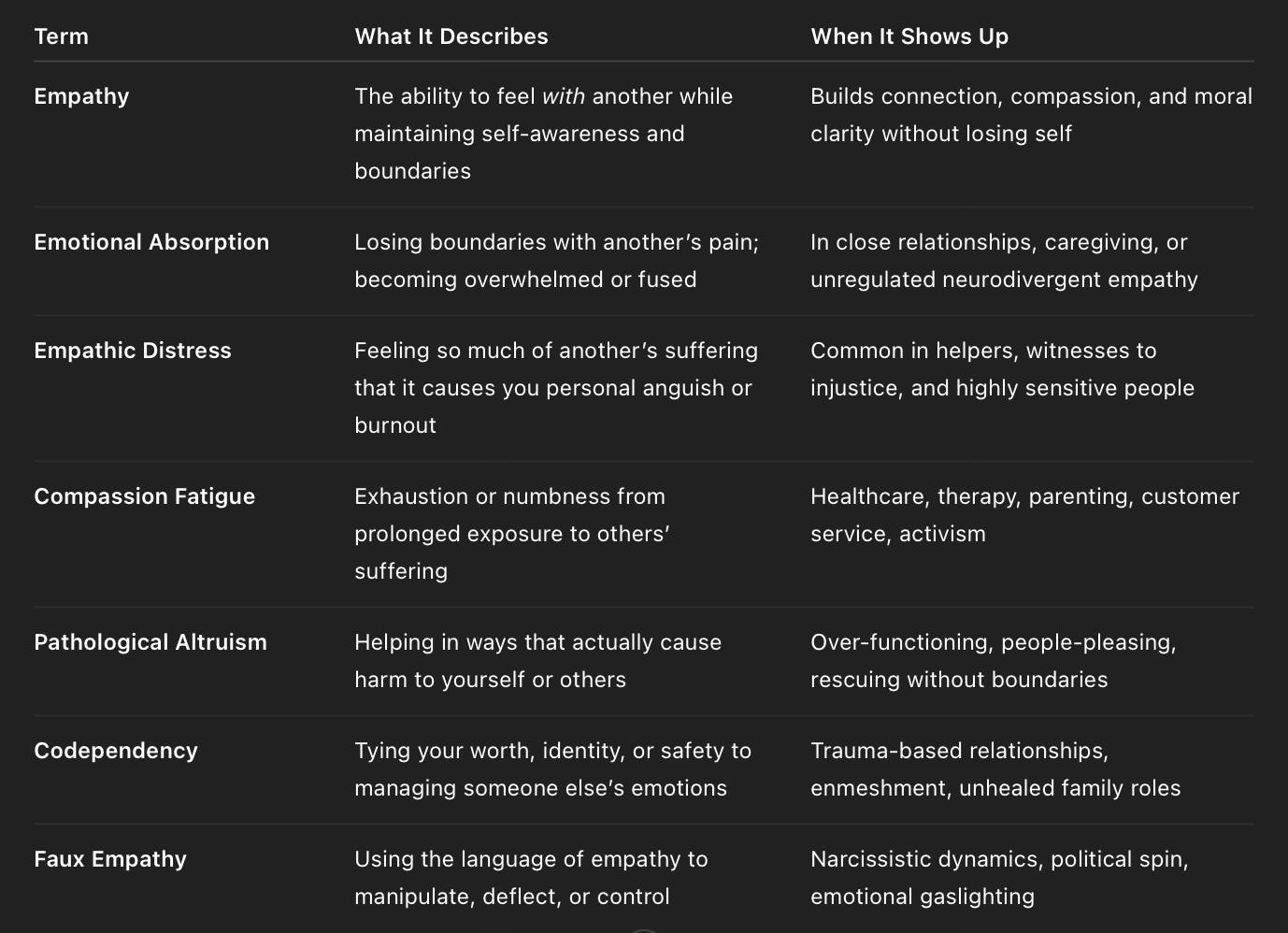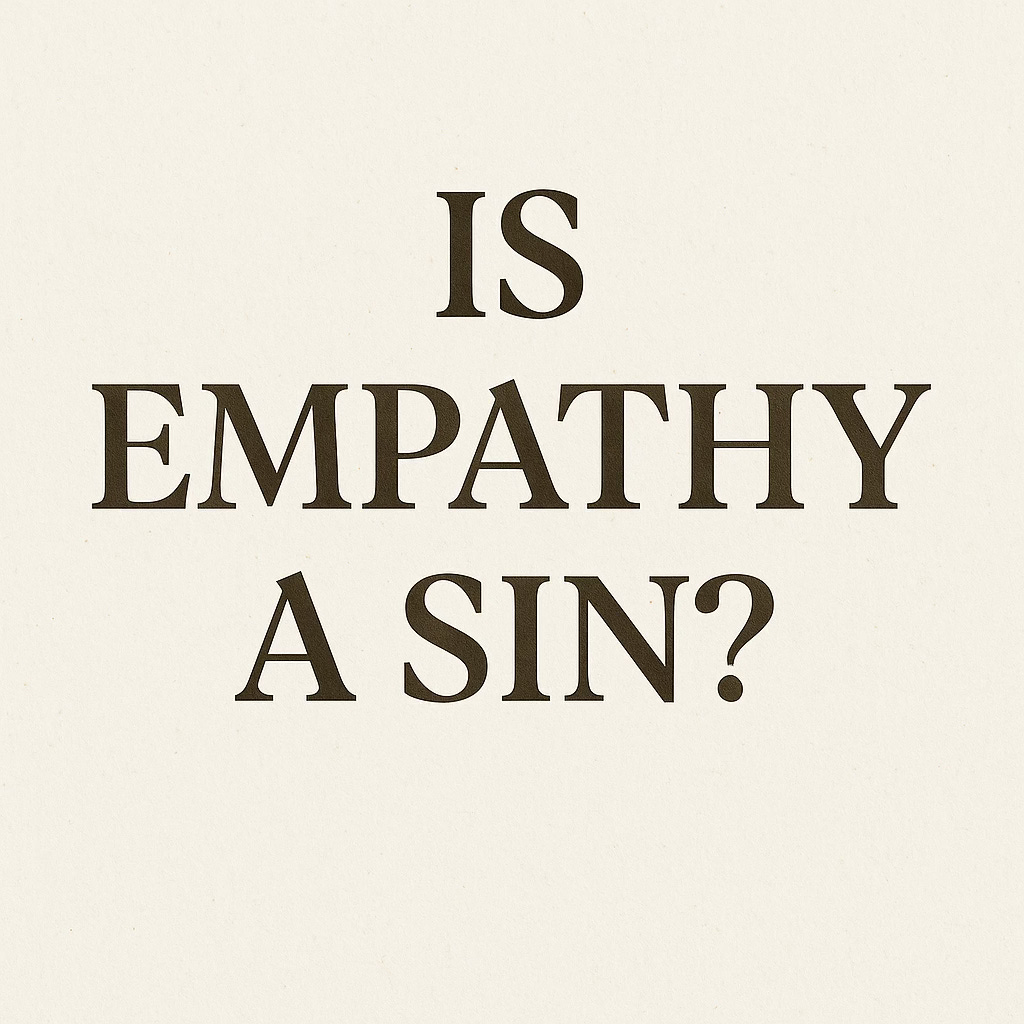Return to the Emotional Heresy Series Hub
Emotion Denial, Religious Trauma, and the Human Cost of Logic-Worship
A word to the reader:
If you’ve ever felt ashamed for feeling too much, doubted your worth because of your struggles, or found yourself dehumanized for being emotionally honest—this post is for you. You are not broken. You are not too much. And you are not alone. This piece draws from personal reflection and systemic insight to unpack the ways we’ve been taught to fear our own emotions—and others’. It is part of a deeper journey of reclaiming what makes us human.
When Self-Soothing Meets Shame
I asked myself recently: How do I know if my self-soothing is healthy or if it’s addiction?
The line, at times, feels razor-thin.
Especially when you’re neurodivergent. Especially when you’ve been told that needing comfort makes you weak. Especially when your behavior is used not just as feedback, but as a verdict.
I’ve realized that part of my healing is this:
Shifting from seeing my behavior as my identity to seeing it as a message.
It’s not: “I can’t stop—I’m a failure.”
It’s: “Something in me is overwhelmed, and this behavior is trying to help.”
But that reframing has been hard-won—because like many people shaped by religious trauma or performance-based worth systems, I was taught early:
Your behavior is who you are.
Struggling means you’re sinful.
Feeling deeply makes you unstable.
Empathy is weakness.
Logic is what saves you.
That framework doesn’t lead to healing. It leads to emotional abandonment.
Of self. And of others.
Dehumanization as Self-Soothing
It’s easy to look at people who dehumanize the homeless, the addict, or those living with visible mental health issues and assume they lack empathy. But I’m not so sure. I think something more tragic is often at play.
What if they were taught, just like I was, that:
Struggle equals sin
Pain is proof of failure
Compassion is dangerous
Emotions are suspect
Helping those who don’t “deserve it” is defiance
What if their rejection of empathy isn’t because they’re cruel—but because they’re scared?
Empathy opens the door to pain.
If you’ve never been taught how to hold pain—if it’s always meant danger, judgment, or chaos—you’ll do anything to shut that door.
Including turning away from suffering.
Or worse: blaming the sufferer.
“They’re just lazy.”
“They made their bed.”
“They chose this life.”
“I worked hard—they didn’t.”
“God helps those who help themselves.”
It’s not empathy they lack.
It’s emotional safety.
Dehumanizing others becomes a kind of self-soothing:
If I can believe they deserve this, then maybe I am still good. Still safe. Still in control.
Logic as Armor: The False Dichotomy
My brother has often said I prioritize emotion while he prioritizes logic. It’s framed like a moral high ground. He says logic is objective, clean, right. Emotion is messy, unreliable, biased.
And yet—I see him make illogical decisions all the time. Like we all do.
Because here’s the truth:
There is no logic without emotion.
All decision-making is filtered through emotion.
When patients in neuroscience studies lose access to emotional processing, they don’t become more logical. They become incapable of choosing. They get stuck endlessly weighing every option, unable to assign value or care.
Emotion is how we tell what matters.
So when someone insists they are “logical, not emotional,” they’re often saying:
I was punished for feeling.
I only felt safe when I performed control.
I don’t know how to sit in pain without trying to fix it or flee from it.
I fear what will happen if I feel too much.
Logic becomes the costume.
Emotion remains the engine.
When Religion Teaches You Empathy Is a Sin
Some of the most aggressive voices against empathy come from modern religious movements. I’ve heard sermons that explicitly say empathy leads people astray. That feelings deceive. That emotions are a trap.
It’s the theology of disconnection:
Don’t trust your heart.
Don’t feel too much.
Don’t extend grace without proof of repentance.
Don’t help those who haven’t earned it.
This is not the message of love. It’s the message of control.
It teaches people that compassion must be deserved. That suffering must be justified. That salvation is for the obedient, not the broken.
And when that theology meets trauma or moral absolutism, the result is devastating:
We mistake numbness for maturity.
We confuse punishment with justice.
We silence grief and call it strength.
We cast out the wounded and call it righteousness.
This isn’t spirituality. It’s emotional self-abandonment disguised as moral superiority.
Empathy and Its Misapplications
So What Do We Do?
We reclaim emotion as data, not disobedience.
We see behavior as a clue, not a curse.
We let empathy live in us without needing to explain or justify itself.
And maybe most importantly:
We learn to soothe ourselves without abandoning others.
Not by numbing.
Not by judging.
Not by suppressing emotion.
But by returning to it, with care.
A Blessing and a Reframe
If you were ever told that your empathy was a sin,
that your feelings were a failure,
that your struggle made you shameful—
I want to tell you:
This is not your identity.
Your behavior is not your worth.
Your feelings are not your flaw.
Your empathy is not your weakness.
Your emotions are part of your humanity.
And your humanity is your strength.
A Question to Reflect On:
What belief about emotions did you inherit that you’re ready to release?
What would change if you saw your feelings as sacred data—not dangerous noise?
What kind of world could we create if we let empathy lead—not as our only compass, but as a necessary part of being whole?





